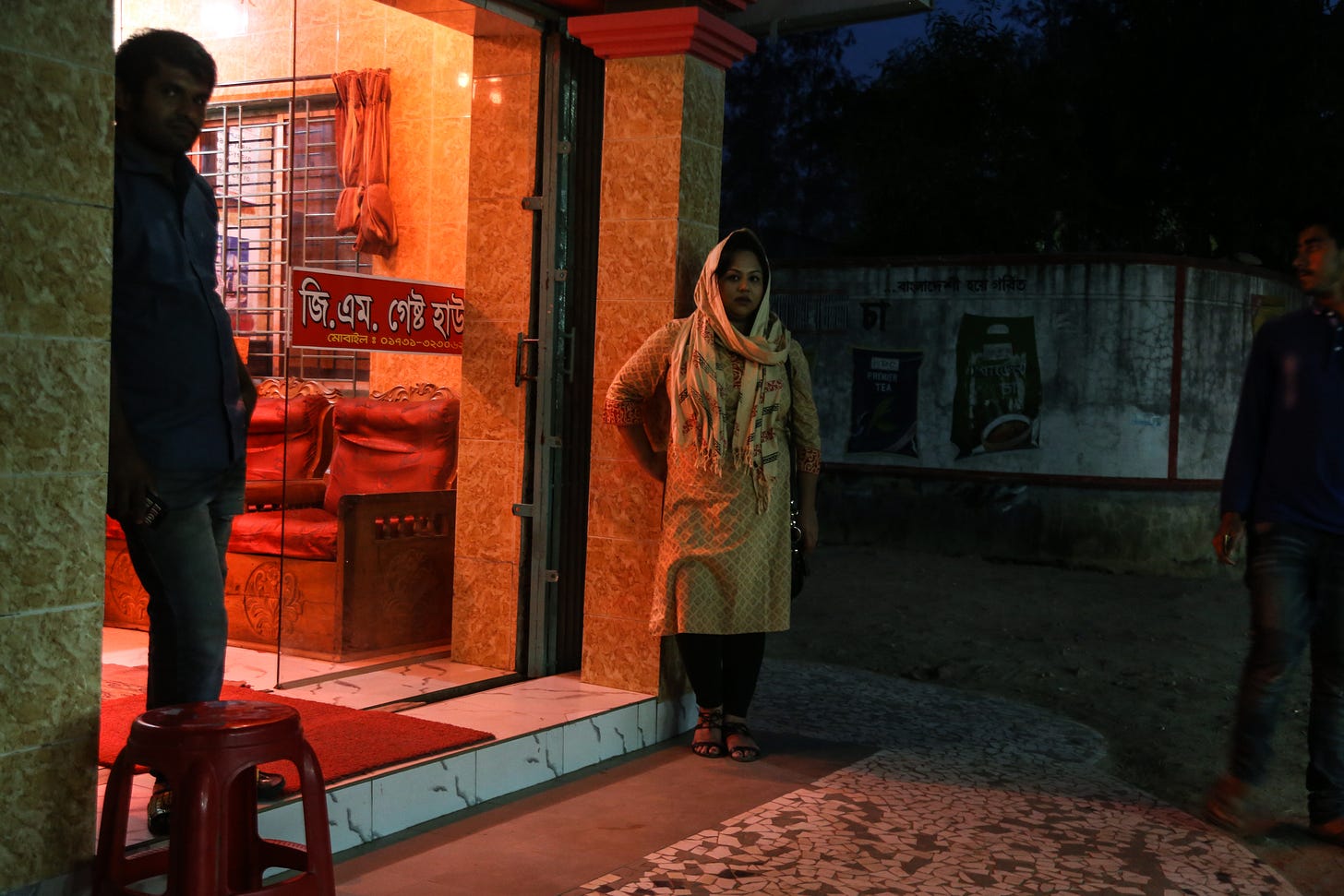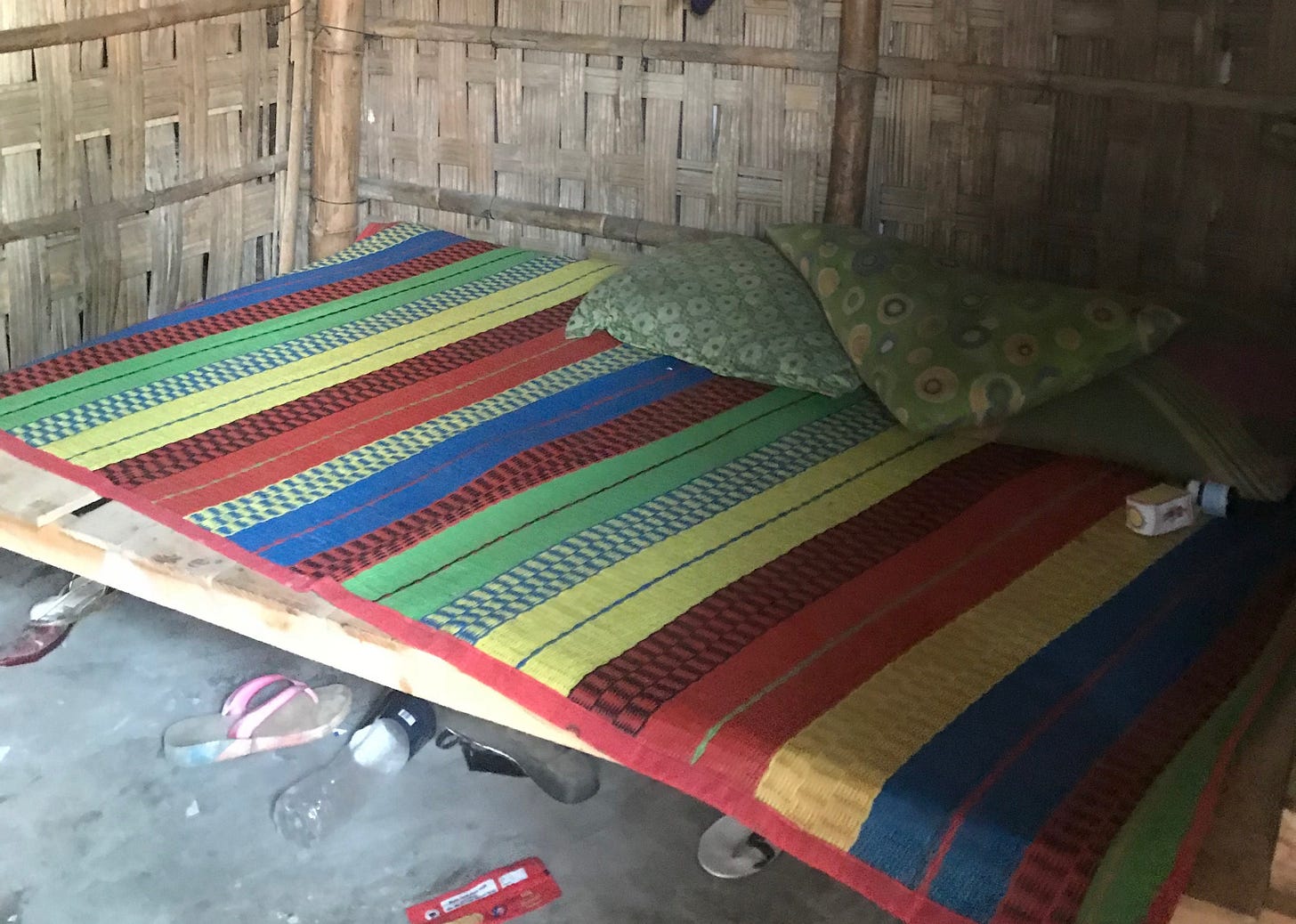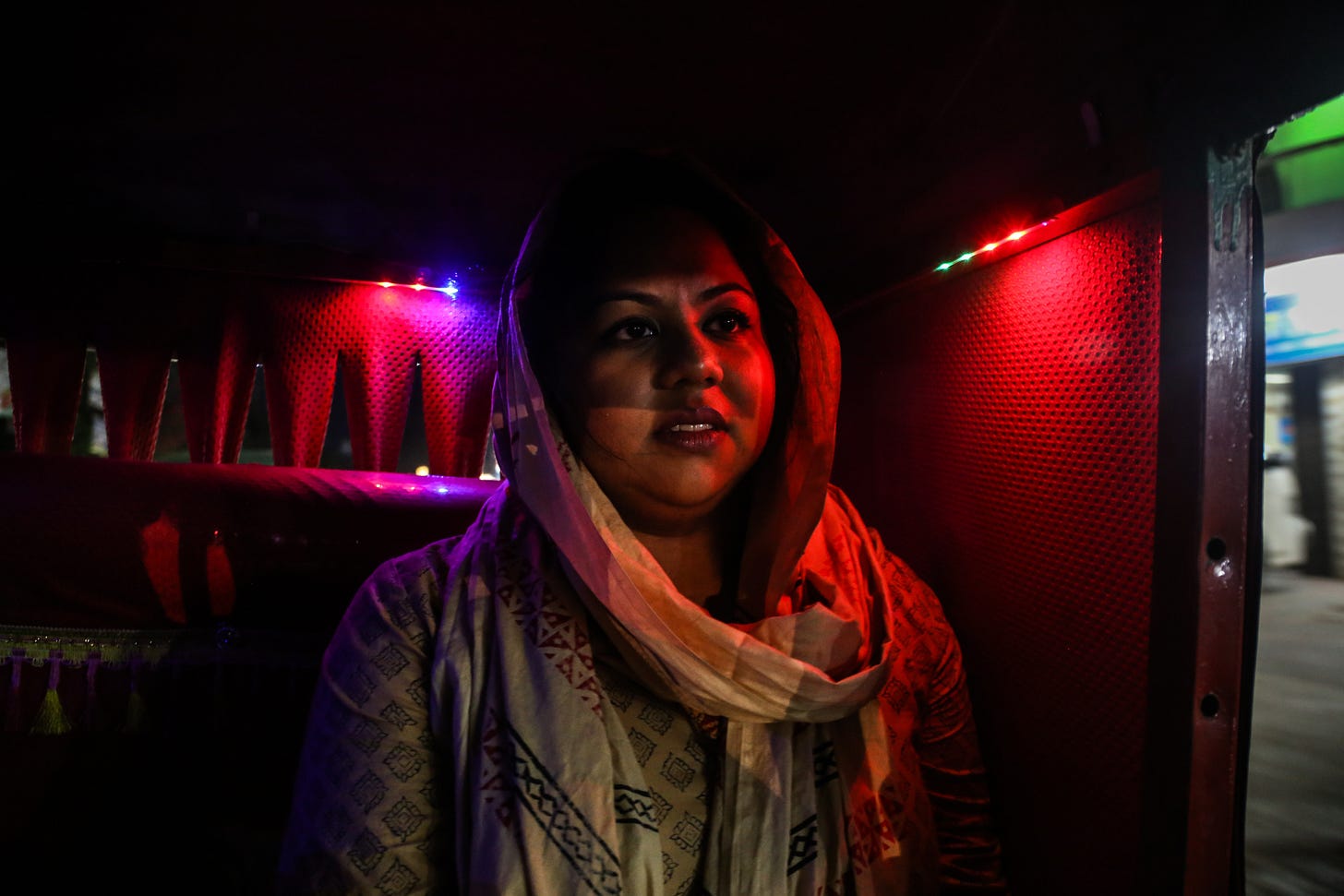That one time I went undercover as a sex worker in Bangladesh
Sex work in Bangladesh is legal but still extremely exploitative and dangerous.
Sex work has been legal and regulated in Bangladesh since 2000, one of just three Muslim countries in the world to legalize prostitution. It might seem strange for a Muslim-majority country with conservative social laws, but if you look at the history of sex work in the Indian subcontinent, it’s not all that surprising. Sex workers have always held a visible place in society. Often referred to as the oldest profession in the world, some brothels in Bangladesh are almost two hundred years old.
One of my favorite movies as a young girl was Umrao Jaan —a Bollywood film about an Indian courtesan in the early nineteenth century. Umrao was kidnapped and sold to a brothel as a pre-teen. I was drawn to Umrao and her peers in their dazzling jewels and ornate dresses, kohl-rimmed eyes and luscious maroon lips—it was the first glimpse of the power of female sexuality I ever had. My conservative Bangladeshi Muslim parents stayed as far as they could from discussions around sexuality but we were allowed to watch a film where the title character sold sex, seduction and intelligence.
According to historian Veena Talwar-Oldenburg, courtesans during this era of South Asian history subvert patriarchal norms. They were independent, wealthy, highly educated women whose male clients didn’t just come to them for sexual companionship but revered them for their original poetry, love ballads, and political opinions. It’s no wonder that this period has been a popular subject in Bollywood, with the recent success of Heera Mandi on Netflix—however far-fetched and over the top the series might be.
When the British colonized India in the late 1800’s, courtesans started losing their place in society and degraded down to common prostitutes without privilege and a revered place in society.
So when I got a chance to go undercover as a sex worker in Bangladesh, I took it.
According to Action-Aid, an international nonprofit organization fighting poverty and injustice, as of January 2013, there were 18 registered brothels and a 2016 UNAIDS report estimates there were around 140,000 sex workers in Bangladesh, but the one I accessed in 2018 as a journalist disguised momentarily as a sex worker isn’t counted among the registered brothels. It was one of the thousands of “quasi-legal” brothels that are dangerously unregulated and rife with child trafficking and abuse.
A fellow journalist, T., was investigating the illegal sex trafficking of minors and Rohingya refugees in Bangladesh and I joined her mission. It was my first investigative mission and I had no idea what I was doing. I was mostly there to observe and learn.
With some sleuthing, T. secured a meeting with a self-proclaimed retired dalal—a pimp at his roadside tea shop in Cox’s Bazar—Bangladesh’s touristy beach town and historic port city, now home to a million Rohingyas refugees from neighboring Myanmar, where there was a violent crackdown against Muslims. T. and I were in town to report on the Rohingya crisis and she had discovered that young Rohingya girls were being trafficked by local pimps.
We introduced ourselves to the dalal as NGO workers because it was risky to admit we were journalists. He suggested disguising ourselves as sex workers if we wanted to go undetected. T. and I are both Bangladeshi-American and were easily able to disguise ourselves as locals. So, we agreed.
The dalal made a quick phone call and a burqa-clad woman came to escort us to the secret brothel. We piled into a tuk-tuk (a three-wheel taxi), got off on a quiet, sleepy main street where the only sound we heard was rickshaw bells, unusual for the booming, crowded country that Bangladesh is reputed to be, and followed our escort into a residential neighborhood. We entered a low gate, and walked through an open-air, narrow corridor lined with small huts with tin roofs on each side. We entered the last room—it belonged to the Madam, the female pimp that owns and runs all the logistics of the brothel and also pockets most of the profits.
She welcomed us with a big smile—a face full of powdery makeup, exaggerated drawn-on eyebrows, thick, red lipstick and wearing a loud eggplant-purple ensemble full of sequins and bling.
As soon as she met me, the Madam reached in for a tight hug, pulled back, gave me a once-over, patted my breasts and said, “you’ll definitely be able to make at least 15,000 taka ($180 USD at the time) every month!”
The Madam offered us the refreshments and told us that her meye (girls) who she considers her daughters come to her of free will. Any of them could leave as they pleased. They called her Ammu—mother.
As she skimmed our healthy American-born and reared bodies, a far cry from the malnourished, underdeveloped bodies of the seven or eight girls we saw milling about, she said was excited we had to come work with her. She would keep us safe and give us the best high-paying clients.
I played the shy, demure girl while T. took on the role of the sassy, smart-aleck—she was far more experienced in going undercover in Bangladesh than I was. I stayed quiet, mostly, fearful that my American-accented Bangla and inexperience would give me away. I admired the Madam’s ostentatious gold rings, touching them lovingly, smiling in reverence to her taste and status as boss-lady to keep suspicions about our identities at bay.
We didn’t have an escape plan. If we got caught for being anything other than what we said we were—girls from the capital city of Dhaka, looking for a quieter place to work as prostitutes—there was no saying what could’ve happened. Nobody from the outside world knew we were there.
A teenage girl, wrapped in a black oorna (scarf) and traditional salwar kameez carried in a tray of sodas and biscuits. “Prema” (name changed) chattered on and on about how well Ammu takes care of them.
“Once we have enough money, Ammu said she will find me a nice boy and get me married,” Prema told us with a giant smile plastered on her face.
Later, while the Madam was chatting away with my colleague, I asked Prema how old she was. I suspected she wasn’t a day over sixteen.
“Eighteen, of course! Ammu would never let us allow to work here if we weren’t of age. It’s illegal, you know!”
Prostitution in Bangladesh is illegal under the age of 18. But, child prostitution is commonplace. Despite the stigma, poverty has forced many young girls and women down this road and Islamic conservatives openly condemn the practice. In 2010, Islamic fundamentalists burned a brothel to the ground. To protect the rights of sex workers, women’s rights organizations pushed to legalize sex work in Bangladesh.
After chatting for a while, the Madam told us we could go see the room next door, the space we would potentially live and work from.
I walked in first and saw a tiny figure on a bamboo cot—face red and swollen, bubbled-up skin around her mouth, curls piled up high on her head, wearing a pink frock with lace ties at the waist and rubbing at her eyes. Lipi said she had just turned fourteen but her prepubescent body said otherwise.
“Come in, Apu (big sister). Have a seat,” Lipi (name changed to conceal identity) smiled and moved over on the cot to make room for us.
Six months ago, Lipi followed a friend to the city on what she thought was going to be an adventure. Instead, her friend sold her to a pimp for 50,000 taka—nearly six hundred dollars.
“I always pray to Allah and say, I didn’t do anything wrong, why did this happen to me?” Lipi picked at the bamboo cot as she told me her story. She said the pimp locked her up and beat her. She was finally sold again to this brothel in Cox’s Bazar, where she says things are better.
Lipi was chatty and charming, full of stories about her childhood. Her parents and siblings back in her hometown, smiling while wiping away the tears on her face. She was from Lohagara, a town just a few hours away from Cox’s Bazaar where we were —a beautiful, hilly place that an ancient king once took refuge in to escape during wartime.
Lipi didn’t seem to be a Rohingya refugee but with Myanmar and Bangladesh sharing a porous border, it was hard to tell who had refugee beginnings and who didn’t.
But as she was talking, tears brimmed in her eyes. When I asked her why she was crying, she burst into tears and held onto her stomach.
“It hurts so bad,” she said as she rocked back and forth. “I won’t go there anymore. They kissed me while I was sleeping. That’s why I have these things around my mouth.”
The red blisters on her face looked like it could be from an STD. Lipi was frail and I suspected she had some sort of sexually transmitted disease. According to a study conducted in 2017, over 41% of the sex workers surveyed in Dhaka showed symptoms of STDs. But underage girls like Lipi who are hidden away from view, have limited access to doctors and help from NGOs that work with sex workers.
‘“I went for a job in the morning,’” she explains. ‘“ As soon as I got into the place, my head got hot when I saw three big men. One of them grabbed me and I said, get off me! Give me my money first! I couldn’t do it.’”
And he said, “baby, you’re such a little girl,” Lipi continued. “He gave me his number. I told him why are you giving me your number, I won’t do it with you! They paid me and said, come back another day. I said all of us? He said, yeah, all of us? We’ll hang out! They paid me and I left.”
Later, she revealed they had drugged and raped her.
“They let me sleep. They gave me a magical pill that didn’t let me feel anything. I told them I was tired and they helped me.”
She’d been crying for the past few days because she hadn’t been feeling well.
“The doctors gave me medicine but they only make me feel worse. I don’t like taking them. Ammu is so nice! She’s okay with me not working right now,” Lipi exclaimed.
Lipi described herself as chanchal. Mischievous. She said she was a pain in her mother’s butt, always going off to explore and now she’s paying the price for it. Her biological mother thinks that the Madam is a benefactress funding Lipi’s education, there was no other explanation that would satisfy her. She calls her mother often.
She dreams of saviors like the young client she met a few months ago who told her she was too nice of a girl to do this kind of work. He wanted to take her away, but that didn’t pan out. Recently, she acquired another young client—a wealthy, attractive, young man from India who takes her to fancy hotels near the beach, but supposedly doesn’t have sex with her. He only wants her to listen to his stories and keep him company while he does drugs.
Lipi also tells me about the older, rich, foreign clients she meets at the 5-star hotels near the beach.
“They usually don’t let me in. I have to pretend to be from Dhaka. Once my hair was really short so I dressed all fancy like a Dhaka girl. and I had to say, hey, I’m from Dhaka! Then they let me in,” Lipi giggles as she tells the story.
The Madam was operating this small brothel illegally and the fear of being caught by the authorities meant that the actual sex work was conducted somewhere else. And the more high-end clients wouldn’t come to a poor brothel with less than desirable settings/furnishings.
Lipi’s more frequent place of business are in small, dingy hotels on a strip near the marketplace in Cox’s Bazar. That’s where the girls are sold off to local tourists.
We didn’t stay with Lipi very long, because the madam was starting to get suspicious about who we really were and why we were asking her girls so many questions. We felt the environment around us change, so we hurried our way back to the van that was hiding a few streets away, waiting to take us back to safety.
A few days later, I went to visit the hotel strip, to see for myself the places Lipi described. As we rode down the street in a tuk-tuk, I saw the men perking up as they peered at my shadowy figure inside the taxi. Sitting in tea stalls next to the hotels, their eyes searched for the parts of me that were hidden behind long sleeves and a scarf but couldn’t hide from their imagination.
I climbed out of the tuk-tuk and positioned myself in front of one of the hotels in a corner. The evening sun was setting and colorful, fluorescent lights from inside the hotels cast shadows on my face, the sun highlighting the curves of my body underneath my traditional salwar kameez as I stood posing as a sex worker. Men, young and old, zoomed in on me as they walked down the street. I looked back at them because I didn’t know how to look away. A few walked up to me. One gestured to follow me with his fingers, but I panicked and sought out my team—my local coordinator and photographer. When they appeared, the man quickly walked off.
My nerves couldn’t handle being ogled by the men on that hotel strip for very long. The men’s gazes felt dangerous enough, I couldn’t even begin to imagine what a child like Lipi felt every day.
As a journalist, my primary purpose is to bring awareness and to be a witness for the world. The lines between activism and journalism are hardly allowed to be blurred, though it’s hard for the two to not overlap as it is empathy and compassion that brings most of us to this profession. But looking back now, I wish I had done more, I wish had reported what I had witnessed to the authorities, even if like everyone else told me, they were likely in on it, taking their own cut of the transaction.
“Are you guys going to stay here?” Lip had asked me as we were leaving the brothel.
I smiled at her. It was all I could do.
“Ammu’s really nice, Lipi pleaded. “Please stay.”
Learn more about sex trafficking in Bangladesh:
WATCH: Traffickers prey on vulnerable refugees (PBS NEWSHOUR)
The Rohingya children trafficked for sex (BBC)
The Living Hell of Bangladesh’s Brothels (The Guardian)





What an interesting read! I'm British Bangladeshi and was out there by myself for the second time last December, I was nowhere near danger but was still scared at times, I can't even imagine this.
i’ve had this article saved for a long time and all i can say is i wish i’d read it sooner—thank you for the amazing work you do